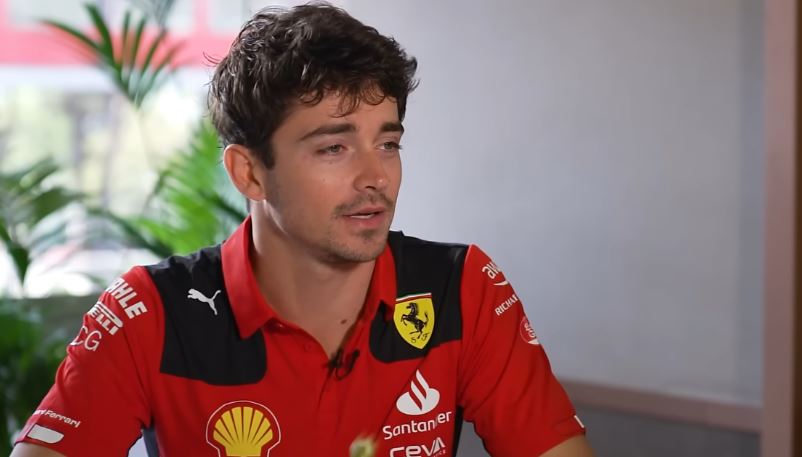Charles Leclerc’s journey to the top of Formula 1 wasn’t solely made possible by his natural talent or Ferrari’s well-maintained machinery; rather, it was paved by two quietly driven parents whose sacrifices are remembered at every turn he makes on the track. Former Formula 3 driver Hervé Leclerc brought more than just his driving prowess to the house in the 1980s. He provided vision. He became the model for his sons, nurturing their potential with unwavering faith rather than professional glory, despite the fact that he himself never earned championship points.
Charles’s mother, Pascale Leclerc, provided an incredibly different kind of support that was less obvious but had a significant influence. She supported the family through difficult financial times by operating a hair salon in Monte Carlo and raising her three sons with consistency, discipline, and love. Pascale became even more prominent after Hervé passed away in 2017, her quiet strength serving as the Leclerc family’s skeleton.
| Charles Leclerc: Personal & Career Information | |
|---|---|
| Full Name | Charles Marc Hervé Perceval Leclerc |
| Date of Birth | October 16, 1997 |
| Birthplace | Monte Carlo, Monaco |
| Nationality | Monegasque |
| Height | 1.80 m |
| Parents | Hervé Leclerc (father), Pascale Leclerc (mother) |
| Siblings | Lorenzo Leclerc, Arthur Leclerc |
| Current Team | Scuderia Ferrari (F1) |
| F1 Debut | 2018 with Sauber |
| F1 Wins | 8 (as of 2024) |
| Notable Achievements | First Monegasque to win Monaco GP in 93 years |
| Official Source | Wikipedia |
Charles has talked candidly about the emotional toll of racing without his father in recent years, particularly following his incredible 2024 Monaco Grand Prix victory. Two days before Charles won a significant victory at the Formula 2 feature race in Baku, Hervé died. That weekend, sorrow turned into fuel. Charles, his eyes glassy as he stood on the podium, not only won for himself, but also for love, legacy, and memory.
Despite having few records, Hervé’s racing career has a significant emotional impact. Hervé had competitive motorsport experience, competing against such notables as Jean Alesi in Formula 3 France, but he was never able to make a name for himself. He discreetly left the cockpit in the late 1980s to pursue a new goal: watching one of his sons achieve greater success than he ever could. He saw the glimmer of that possibility early on in Charles.

Hervé has been there for Charles since he was a young boy racing karts in Brignoles—coaching, modifying, and watching. They frequently scraped together enough money to pay for tires or transportation, spending their weekends in pit lanes and garages rather than five-star hotels. Pascale, on the other hand, put in a lot of overtime behind the scenes. Despite being less obvious, she played a crucial role. Similar to a home front racing strategist, she oversaw logistics, packed lunches, and maintained composure under duress.
Charles became more than just a proficient driver as a result of this combination of hands-on mentoring and maternal grounding. He became emotionally intelligent, admirably grounded, and remarkably reflective as a result of it. Fans notice that he strikes a rare balance, especially when he thanks his upbringing in interviews with an honesty that feels surprisingly natural.
Charles and his older brother, Lorenzo, used to share the track, but Lorenzo eventually stepped aside to support his sibling’s ascent. Lorenzo sacrificed his own dreams for Charles’s in a heartwarming act of familial selflessness. The Leclerc family’s involvement in motorsport is further extended by his younger brother Arthur, who presently competes in the Formula 2 championship. One race at a time, the three brothers work together to continue Hervé’s peaceful dream.
According to this perspective, Charles’s rise is more than just a personal achievement; it represents a larger movement in professional sports: the increasing recognition of the familial roots that underpin superstar careers. Whether it’s Lewis Hamilton mentioning his father’s long hours and sacrifices or Serena Williams discussing her father’s discipline, the origin stories in many recent instances all point to the same unsung heroes: parents.
Leclerc’s story also highlights emotional transparency, which is becoming more and more uncommon in high-profile sports. When others might try to get the limelight for themselves, he doesn’t hesitate to talk candidly about loss or give his parents credit. He has become incredibly relatable as a result of his vulnerability, which has been expressed in press conferences and on social media. His emotional openness is especially captivating in a time when polish is frequently valued more highly than genuineness.
This increased emotional transparency represents a subtle but significant development for the sport itself. For a long time, Formula 1 has been a sport that rarely deviates from buttoned-up precision. However, the racing circuit is becoming more emotionally dynamic as Charles and others, such as Lando Norris and George Russell, embrace a more comprehensive representation of their identities. It’s about legacy, struggle, and humanity, not just lap times.
Charles’s name will surely come up in title discussions, technical arguments, and Grand Prix previews in the upcoming seasons. His influence, however, is already felt well beyond the paddock, having been molded and maintained by his parents. Hervé and Pascale fostered resiliency, empathy, and authenticity in addition to raising a champion.
